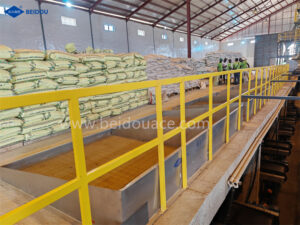The Impact of Precision Fertilizer Application on Crop Production
The Impact of Precision Fertilizer Application on Crop Production
**Introduction:**
Precision fertilizer application is revolutionizing modern agriculture, offering significant benefits for crop production. By using advanced technology to apply fertilizers accurately and efficiently, farmers can optimize nutrient use, enhance crop yields, and promote sustainable farming practices. This article explores the profound impact of precision fertilizer application on crop production and its role in the future of agriculture.
**1. Enhanced Nutrient Efficiency:**
Precision fertilizer application involves using technologies such as GPS-guided equipment, variable rate technology (VRT), and soil sensors to apply fertilizers with pinpoint accuracy. This method ensures that nutrients are delivered precisely where they are needed, minimizing waste and maximizing nutrient uptake by plants. Enhanced nutrient efficiency reduces the overall amount of fertilizer required, lowering input costs and decreasing the risk of nutrient runoff and environmental pollution.
**2. Improved Crop Yields:**
Accurate fertilizer application directly contributes to improved crop yields. By providing plants with the right amount of nutrients at the right time, precision agriculture supports optimal plant growth and development. Crops receive a balanced supply of essential nutrients, leading to healthier plants, increased resistance to pests and diseases, and ultimately, higher yields. Studies have shown that precision fertilizer application can significantly boost crop productivity compared to traditional fertilization methods.
**3. Cost Savings:**
One of the most significant advantages of precision fertilizer application is cost savings. By reducing the amount of fertilizer needed and ensuring efficient use, farmers can lower their input costs. Additionally, the increased crop yields resulting from precise nutrient management translate to higher revenue. Over time, the investment in precision agriculture technology pays off, making it a financially viable option for both small and large-scale farmers.
**4. Environmental Sustainability:**
Precision fertilizer application promotes environmental sustainability by minimizing the ecological impact of farming practices. Traditional methods of fertilizer application often lead to over-application, resulting in nutrient runoff into water bodies and soil degradation. Precision agriculture techniques, however, ensure that fertilizers are applied only where and when needed, reducing the risk of nutrient leaching and preserving soil health. This environmentally friendly approach supports sustainable agriculture and helps protect natural resources.
**5. Soil Health Maintenance:**
Maintaining soil health is crucial for long-term agricultural productivity. Precision fertilizer application contributes to soil health by preventing the over-application of nutrients, which can disrupt soil microbial communities and lead to soil compaction and erosion. By applying the right amount of fertilizer, farmers can maintain a healthy balance of nutrients in the soil, supporting robust plant growth and ensuring sustainable crop production for future generations.
**6. Adaptation to Variable Field Conditions:**
Fields often have varying soil types, nutrient levels, and moisture conditions. Precision fertilizer application allows farmers to adapt to these variable field conditions by applying different amounts of fertilizer to different parts of the field. This site-specific management ensures that each area of the field receives the appropriate level of nutrients, optimizing overall crop performance and reducing the risk of nutrient deficiencies or excesses.
**7. Data-Driven Decision Making:**
Precision fertilizer application relies on data from soil tests, yield maps, and crop sensors to inform decision-making. This data-driven approach allows farmers to make informed choices about fertilizer types, application rates, and timing. By leveraging real-time data and advanced analytics, farmers can fine-tune their fertilization strategies to achieve the best possible outcomes. This precision leads to more efficient resource use and higher crop productivity.
**8. Increased Crop Quality:**
In addition to improving yields, precision fertilizer application can enhance the quality of crops. Optimal nutrient management supports the development of healthier plants, resulting in higher-quality produce with better nutritional content and market value. For crops like fruits and vegetables, precision application can lead to improved taste, color, and shelf life, making them more appealing to consumers and increasing their marketability.
**Conclusion:**
Precision fertilizer application has a transformative impact on crop production, offering numerous benefits such as enhanced nutrient efficiency, improved crop yields, cost savings, and environmental sustainability. By adopting precision agriculture techniques, farmers can optimize their fertilization practices, promote soil health, and achieve more sustainable and profitable farming operations. As technology continues to advance, the adoption of precision fertilizer application will play a crucial role in the future of agriculture, helping to meet the growing global demand for food while protecting the planet’s natural resources.
